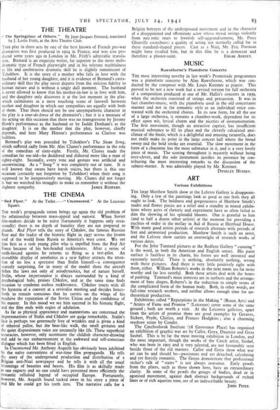THE CINEMA
THE week's propaganda ration brings up again the old problem of the relationship between mass-appeal and naiveté. When Soviet film-makers decide to be naive (fortunately it happens only occa- sionally) there is no depth of banality they are not prepared to plumb. Red Flyer tells the story of Chkalov, the famous Russian flyer and the leader of the historic flight in 1937 across the frozen roof of the world from Russia to America's west coast. We see him first as a rash young pilot who is expelled from the Red Air Force because of his hot-headed recklessness. After a series of earth-bound agonies he returns to flying as a test-pilot. An incredible display of aerobatics in a new fighter attracts the atten- tion of no less a spectator than Stalin himself—a consequence scarcely surprising, for in many of the model shots the aircraft defies the laws not only of aerodynamics, but of nature herself. Stalin, whose impersonator is always surrounded by a kind of psychological halo, praises Chkalov, and at the same time finds occasion to condemn useless recklessness. Chkalov reacts with all the hysteria of a convert at a revivalist meeting and decides hence- forth to remain conscious that he carries on the wings of his machine the reputation of the Soviet Union and the confidence of his master. In this mood we see him succeed in his historic flight, and the film ends with orgies of adulation.
As far as physical appearance and mannerisms are concerned the impersonations of Stalin and Chkalov are quite remarkable. Stalin's face is perhaps too generously free of wrinkles and is given a kind of ethereal pallor, but the bear-like walk, the small gestures and the quiet dispassionate voice are uncannily like life. These superficial -accuracies, however, only accentuate the childish character-drawing and add to our embarrassment at the awkward and self-conscious dialogue which has been fitted in English.
In Uncensored Mr. Anthony Asquith has obviously been inhibited by the naive conventions of war-time film propaganda. He tells the story of the underground production and distribution of a Belgian anti-Nazi newspaper and he tells it with all the usual trimmings of beauties and beasts. His film is as skilfully made as one expects and no one could have presented more efficiently the romantic celluloid legend of occupied Europe. Fortunately, however, Mr. Asquith found tucked away in his story a piece of real life he could get his teeth into. The narrative calls for a
Belgian betrayer of the underground movement and in the character of a disappointed and effeminate actor whose mood swings violently from neu rotic tears to feverish self-aggrandisement, Mr. Peter Glenville contributes a quality of acting not normally called for in these standard-shaped pieces. Cast as a Nazi, Mr. Eric Portman might have rivalled him, but in this film he is a democrat and


























 Previous page
Previous page